The vibrant city of Hanoi, the capital of Vietnam, is not just the political heart but also a pulsating hub of culture, history, and modernity. With a rich tapestry of over a thousand years of evolution, the city has seen its population and geography change dynamically. Situated in the Red River Delta, Hanoi blends stunning landscapes with a dense urban core, reflecting its historical roots and contemporary growth. In 2025, Hanoi stands as a beacon of development amidst the rapidly evolving landscape of Southeast Asia, drawing interest not only for its economic potential but also for its unique demographic tapestry.
Geographical Layout of Hanoi
Hanoi’s geography is an intricate mix of natural and urban elements, making it a unique metropolis in Vietnam. It occupies the center of North Vietnam, spanning an area of 3,328.90 km² (1,285.30 sq mi), bordered by several provinces including Thai Nguyen, Vinh Phuc, and Bac Ninh. The city’s topography is largely dominated by the Red River, known locally as the Hong River, flowing through its heart and shaping much of its landscape.

The city’s altitude is a mere 32 meters above sea level, which has historically impacted its climate and architecture. The landscape has made Hanoi prone to flooding, but over the years, infrastructural developments and urban planning have mitigated these risks. The region is characterized by its flat plains, which have facilitated the development of agricultural activities alongside rapid urbanization.
The geographical location of Hanoi affords it a humid subtropical climate, marked by hot, humid summers and cool, dry winters. This climate sets the stage for the rich biodiversity that can be found within and around the city, including several parks and nature reserves. It’s this very climate that has shaped the lifestyle and culture of the people, lending itself to outdoor activities and festivals throughout the year.
Topographical Features
A deeper look into the city’s topography reveals numerous lakes, rivers, and ancient architecture peeking through modern skyscrapers. Notable geographical features include West Lake, the largest freshwater lake in Hanoi, which is a popular spot for both residents and tourists. Additionally, the city’s location makes it a prime area for agriculture, supported by fertile soil and ample water supply from the Red River.
- 🌳 West Lake: A beautiful freshwater lake surrounded by luxury hotels and bustling cafes.
- 🏞️ Red River: That cuts through the city providing scenic views and agricultural nourishment.
- 🏰 Ba Dinh Square: Home to many important government buildings and historical sites.
- 🌄 Co Loa Citadel: An ancient structure dating back to 257 BC, reflecting Hanoi’s storied past.
The architectural style across Hanoi’s landscape includes French colonial architecture alongside traditional Vietnamese styles, which makes it a city of both historical and modern interest. Furthermore, this unique blend illustrates how Hanoi has managed to retain its historical heritage while embracing the new age of development.
Demographics of a Growing Metropolis
As of 2025, Hanoi’s population continues to expand steadily, with over 8 million inhabitants, making it the second-largest city in Vietnam. This thriving population is a vibrant mix of ethnic groups, cultures, and languages, each contributing to the rich tapestry that defines the city. The Han Chinese, Tay, and Thai minorities, among others, coexist harmoniously within Hanoi, adding layers of cultural diversity and complexity to its demographics.
The city’s population density stands at approximately 2,012.6 people per km², reflecting both the urban sprawl and the concentration of communities within the central districts. Such a density presents both challenges and opportunities. On one hand, it encourages the development of extensive public transportation and infrastructure, while on the other, it pushes the city to implement innovative solutions in urban planning and development.
A Diverse Cultural Mosaic
Hanoi’s rich cultural diversity can be attributed to its historical significance as a hub for trade, politics, and education. The city hosts a multitude of cultural festivals, catering to the diverse demographic fabric. From the bustling New Year celebrations to the serene Mid-Autumn Festival, every season in Hanoi speaks to a different cultural rhythm.
- 🌟 Ethnic Groups: Vietnamese Kinh, Han Chinese, Tay, Thai, and other minorities.
- 🗣️ Languages: Predominantly Vietnamese, with pockets of Mandarin, English, and local dialects.
- 🌏 Cultural Events: Tran Temple Festival, Co Loa Festival, and Le Mat Snake Festival are prominent.
Education also plays a vital role in shaping Hanoi’s demographics. The city is home to Vietnam National University, Hanoi, and several other prestigious institutions that attract students from all over the world. This influx of young minds not only boosts the city’s intellectual and cultural vibrancy but also contributes significantly to its demographic evolution.
Administrative Structure and Urban Development
Hanoi’s governance structure is uniquely tailored to manage its complex demographic and geographical landscape. The city is divided into 30 districts, which include urban precincts as well as rural townships and communes. This division ensures that each area receives focused administrative attention, aiding in localized governance and development planning.
The city’s municipal administration oversees a hybrid blend of modern development projects and preservation initiatives. Authorities aim to balance the city’s rapid urbanization with cultural and historical conservation efforts. Urban planning in Hanoi involves the construction of new residential areas, enhancement of transportation networks, and the development of green spaces to improve living standards.
Key Urbanization Projects
Steps taken by the government to modernize Hanoi include significant infrastructure projects that aim to ease congestion and improve quality of life. The development of new urban areas such as Ho Tay (West Lake) and the redevelopment of older areas like the Hanoi Old Quarter are key focus points.
- 🚗 Transport Innovations: Expansion of metro lines and improvements in the bus network.
- 🏙️ Residential Growth: Construction of new housing projects in Gia Lam and Dong Anh districts.
- 🌆 Urban Green Spaces: Development of parks like Bach Thao Botanical Garden.
Economic Influence and Corporate Presence
Hanoi stands as a critical economic driver in Vietnam, showcasing a blend of traditional industries and modern services. The city hosts numerous international corporations and brands, creating a dynamic business environment attractive to investors worldwide. From tech giants like Samsung and Viettel to consumer goods leaders such as Unilever and Nestlé, Hanoi is a focal point for economic activity.
Corporate Dynamics and Opportunities
The presence of multinational companies in Hanoi has led to unprecedented economic growth, supporting both the local and national economy. The city provides a conducive environment for business growth, supported by a young, educated populace eager to engage in a myriad of industries.
- 💼 Major Companies: Samsung, Toyota, VinGroup, and BIDV have significant operations.
- 📈 Financial Growth: Focus on sustainable business practices and innovation.
- 🌐 Consumer Markets: Heineken and PepsiCo cater to Vietnam’s growing consumer base.
Hanoi’s strong economic foundations continue to attract expatriates and global talent. This mix enriches the city’s workforce diversity, propelling Hanoi toward its vision of becoming a leading economic center in Southeast Asia. The entrenchment of these corporations has significant effects on urban planning, lifestyle, and the overall socio-economic fabric of the city.
Tourism and Cultural Heritage
Hanoi is not just a city of industry and governance; it is also a vibrant cultural epicenter that attracts tourists from across the globe. Steeped in history, the city offers a multitude of attractions that showcase both its traditional and colonial past. Landmarks like the Hoan Kiem Lake, the Historic Quarter, and the Temple of Literature paint a vivid picture of the city’s rich historical tapestry.
The city’s hospitality sector has grown exponentially, with brands such as Nescafé and local culinary icons providing a delightful culinary journey for visitors. Street food remains a quintessential part of the Hanoi experience, attracting food enthusiasts to immerse themselves in the bustling local life.
Key Attractions and Experiences
Hanoi’s tourism is also bolstered by cultural events, museums, and performances that offer glimpses into Vietnam’s fascinating culture and history. The Old Quarter is a bustling maze of narrow streets, filled with souvenir shops, local eateries, and artisan merchants.
- 🏯 Historical Landmarks: Ho Chi Minh Mausoleum, One Pillar Pagoda.
- 🍜 Culinary Delights: Famous for pho, banh mi, and street stalls offering local delicacies.
- 🎭 Cultural Performances: Water puppet theatre and traditional music shows.
The blend of cultural heritage and modern-day excitement continues to make Hanoi an appealing destination for tourists. In 2025, it stands as a cultural treasure trove in Southeast Asia, inviting visitors to explore its dynamic and excitement-filled streets.
FAQ about Hanoi’s Demographics and Geography
🌐 What is the current population of Hanoi as of 2025?
Hanoi’s population as of 2025 is over 8 million, making it the second-largest city in Vietnam.
🗺️ What are the prominent geographical features of Hanoi?
Hanoi is characterized by the Red River running through the city, numerous lakes, and an overall flat topography that defines its landscape.
🌍 What cultural diversity exists within Hanoi?
The city hosts a mix of ethnic groups including Vietnamese Kinh, Han Chinese, and Tay, each adding to Hanoi’s rich cultural mosaic.
🏙️ How is Hanoi administratively organized?
Hanoi is divided into 30 administrative districts that include both urban precincts and rural areas, facilitating detailed governance and development.
📊 Which major companies have a presence in Hanoi?
International corporations like Samsung, Viettel, Toyota, and Unilever have significant operations in Hanoi, impacting its economic landscape.
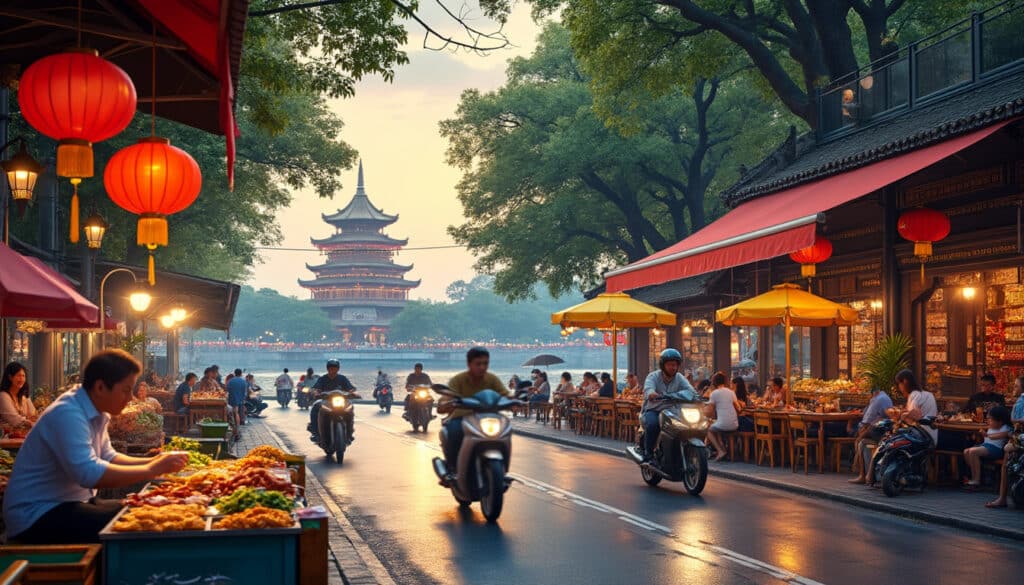
Fun Facts & Curiosities About Hanoi
Hanoi, the vibrant capital of Vietnam, is a fascinating mix of rich history, unique traditions, and modern progression. From its celebrated street food scene to the captivating water puppet shows, Hanoi is both a city of lakes and legends. Visitors…
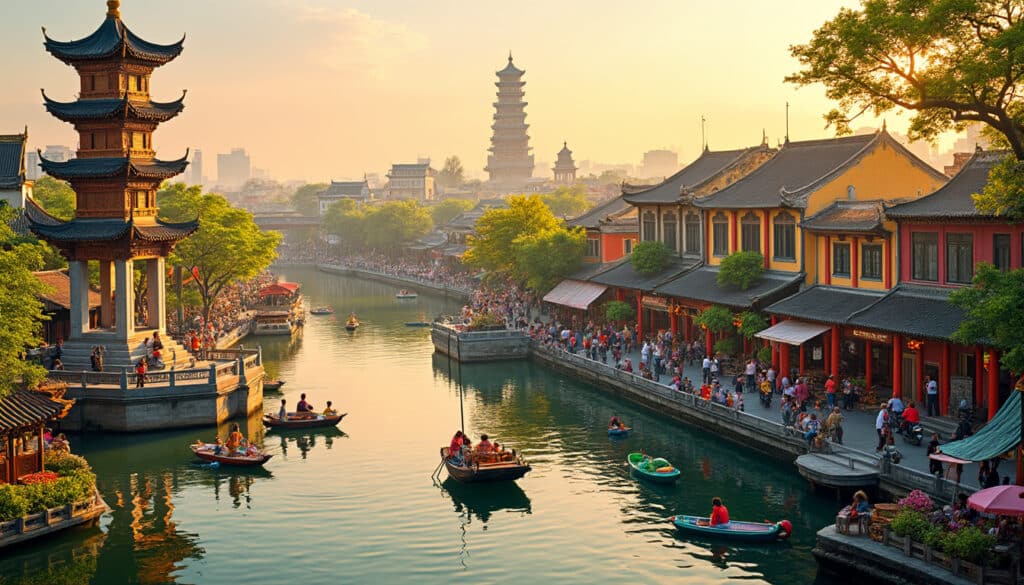
Architecture and urban features of Hanoi
With a rich tapestry of cultures and historical evolution, Hanoi stands as a captivating testament to Vietnam’s architectural diversity. This city’s allure doesn’t just lie in its remarkable history but in its unique blend of oriental and French-style architecture that…
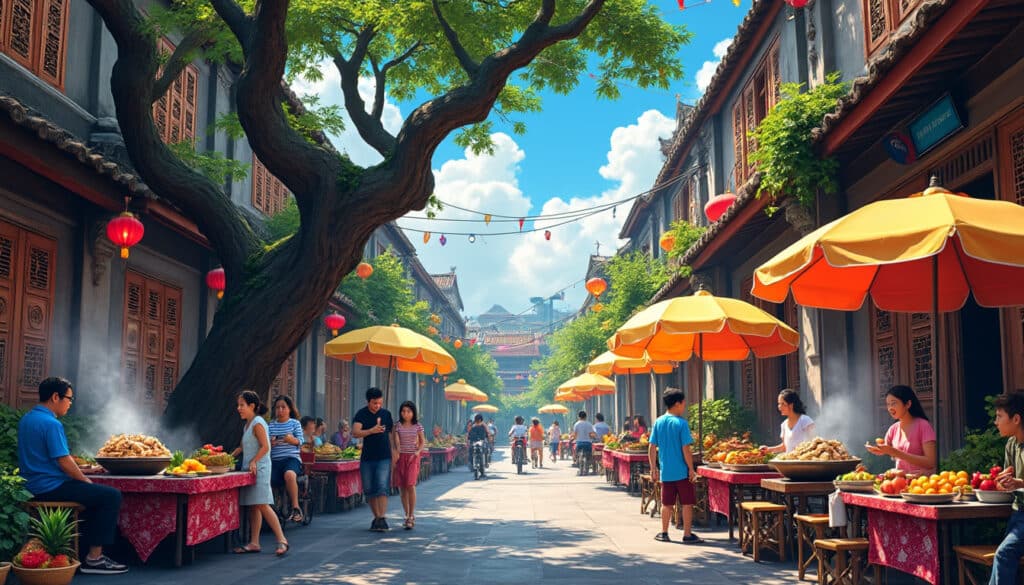
Experience the daily life in Hanoi, a city brimming with vibrant charm and historical depth. As you navigate through the bustling streets, the harmonious blend of the old and new reveals itself in every corner. From savoring delectable street food…
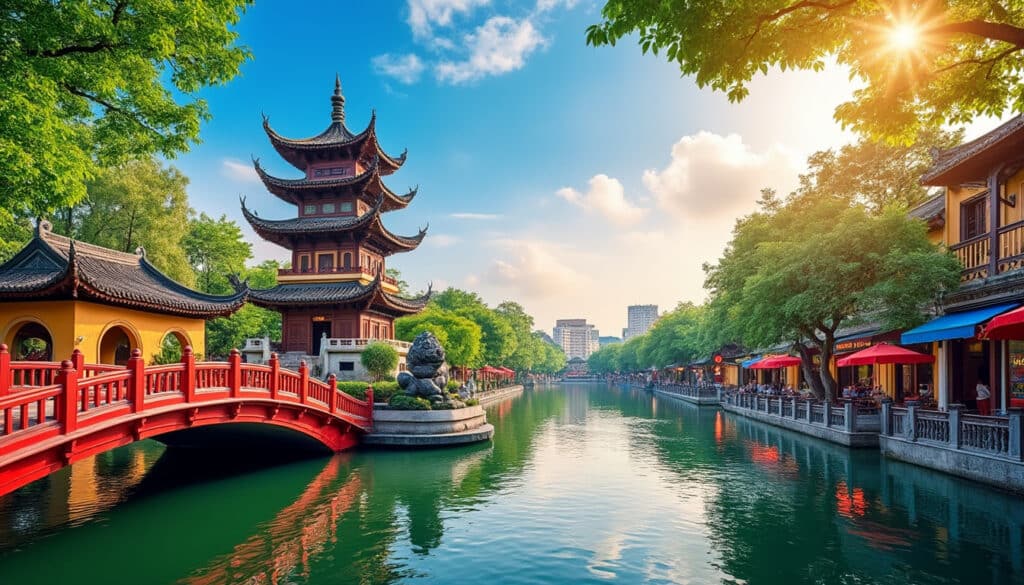
Welcome to Hanoi, Vietnam’s enthralling capital, where the echoes of ancient history resonate through its vibrant streets. With over a millennium of culture and conquest, Hanoi is a city where the past seamlessly intertwines with modernity. From bustling street markets…

Holidays and celebrations in Hanoi
Hanoi, the pulsating heart of Vietnam, offers a tapestry of vibrant festivals and celebrations that reflect its rich cultural heritage and traditions. Throughout the year, local and international visitors witness an enchanting blend of the past and present, as the…

Language and spelling of Hanoi
Hanoi, the vibrant capital of Vietnam, is a melting pot of cultures, histories, and languages. It’s not just a city known for its charming architecture or vibrant street life, but also for its linguistic diversity that reflects its historical tapestry.…

Local tips for tourists in Hanoi
Exploring Hanoi, Vietnam’s thousand-year-old capital, is a journey into a world where ancient traditions and modern dynamism converge. With its rich cultural heritage, vibrant street life, and aromatic cuisine, Hanoi captivates every traveler. Yet, navigating this bustling city can be…

Names, flags, and identity of Hanoi
In the heart of Vietnam, Hanoi stands as a testament to the cultural and historical richness that has evolved over millennia. The names, flags, and identity of this vibrant city are not just labels or symbols, but threads woven into…

Reputation and identity of Hanoi
As the capital city of Vietnam, Hanoi’s reputation and identity intertwine richly with its historical and cultural legacies. Emblematic for its historic architecture, street food, and melodious water puppet shows, the city pulsates with the quintessential Vietnamese spirit. From its…

As the vibrant capital of Vietnam, Hanoi is a city that offers an intriguing blend of history, modernity, and cultural diversity. Understanding the rhythm of this bustling metropolis goes beyond its rich traditions and lively street scenes. The way time…

Unusual facts and social issues in Hanoi
Hanoi, the bustling capital of Vietnam, is a city that fuses ancient traditions with rapid modernity. Known for its rich cultural heritage, Hanoi’s unique blend of history and progression offers a fascinating backdrop for unusual facts and social dynamics that…
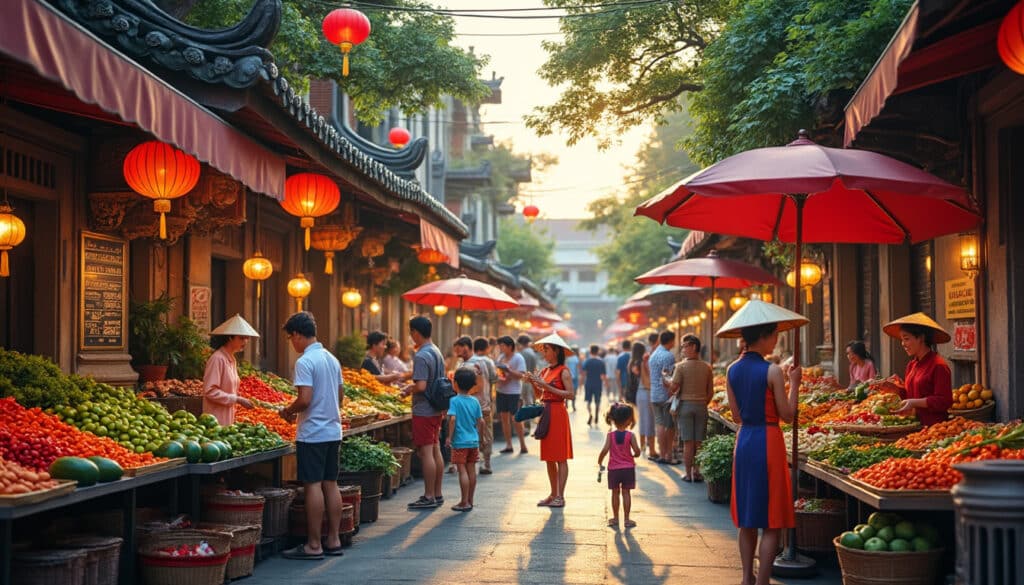
What does Hanoi look, smell, feel like?
Experiencing Hanoi is like stepping into a symphony of vibrant images, lively sounds, and delightful scents. Nestled between historic roots and modern hustle, Vietnam’s capital offers a unique sensory journey. Whether you’re wandering through the alleys brimming with local art…


